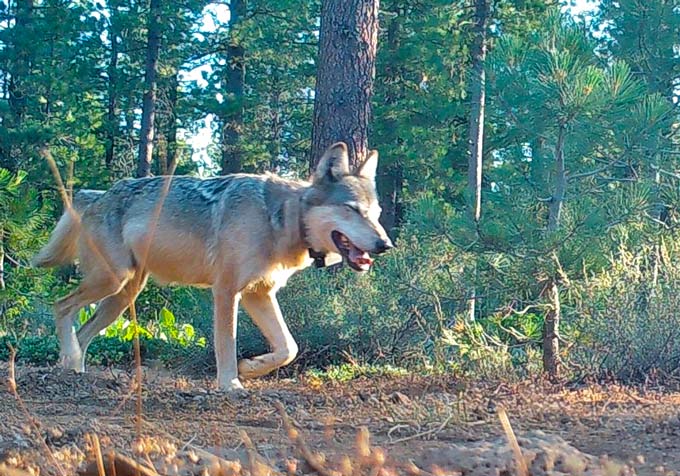
Wolf Photo credit: California Department of Fish and Wildlife
April 22, 2024 - With $3 million in grant funding exhausted, the California Department of Fish and Wildlife is no longer accepting applications for the wolf-livestock compensation program, the agency announced last week.
A total 109 grants were awarded to 36 ranchers with livestock operations in four of the nine counties with known wolf activity: Siskiyou, Lassen, Plumas and Tulare, according to a CDFW report summarizing how the money was used.
CDFW said all funds ran out by March 8. Established in 2021, the pilot program compensated livestock producers for verified loss of livestock occurring on or after Sept. 23, 2021; nonlethal deterrence of wolf presence near livestock; and indirect impacts of wolf presence on livestock.
Most of the money—more than $1.9 million—went to 56 grants for deterrent tools. The department awarded $945,131 and 27 grants for impacts related to wolf presence. Direct livestock losses accounted for $135,044 and 26 grants.
Siskiyou County received 67% of the funding, with 62 grants worth more than $2 million. Seventeen grants were awarded for direct losses, 36 for deterrence and nine for wolf presence.
In Lassen County, 23 grants worth $490,028, or 16% of all funds, were awarded. Five grants were for direct losses, eight for deterrence and 10 for wolf presence.
With 23 grants, Plumas County received $476,356, with four grants going to direct losses, 11 to deterrence and eight to wolf presence.
One grant worth $15,938 went to one Tulare County producer for deterrence.
In the four counties that received payment, six known wolf packs have established territories: Whaleback, Lassen, Harvey, Beckwourth, Beyem Seyo and Yowlumni. The Whaleback pack in Siskiyou County and the Lassen pack in Lassen and Plumas counties were known to CDFW throughout the interim and pilot program period.
“During the pilot program period, substantially more confirmed and probable wolf-livestock depredation events occurred in Siskiyou County than any other county in California,” CDFW reported, noting that 57 wolf depredations in Siskiyou County, 10 in Lassen County and one in Plumas County.
Producers affected by the Whaleback pack received more than 67% of all funds and were awarded $116,809 for direct losses, more than $1.3 million for deterrence and $556,452 for wolf presence.
Those affected by the Lassen pack received 28% of all funds, with $15,724 going to direct losses, $464,654 for deterrence and $365,687 for wolf presence.
Impacts by other wolf packs accounted for 4.5% of total funds. Ranchers affected by the Harvey pack in Lassen and Shasta counties were awarded $1,600 for direct losses, $42,497 for deterrence and $22,992 for wolf presence.
Producers affected by the Beckwourth pack in Plumas and Sierra counties, and the Yowlumni pack in Tulare County used all their funds for deterrence. All grants awarded to producers affected by the Beyem Seyo pack in Plumas County were for direct losses.
Producers submitted applications based on their current and anticipated needs to reduce wolf-livestock conflict and eligibility for direct losses and wolf presence, the department said.
The California Farm Bureau Federation works to protect family farms and ranches on behalf of nearly 32,000 members statewide and as part of a nationwide network of more than 5.5 million Farm Bureau members.
Source: Reprinted with permission CFBF








